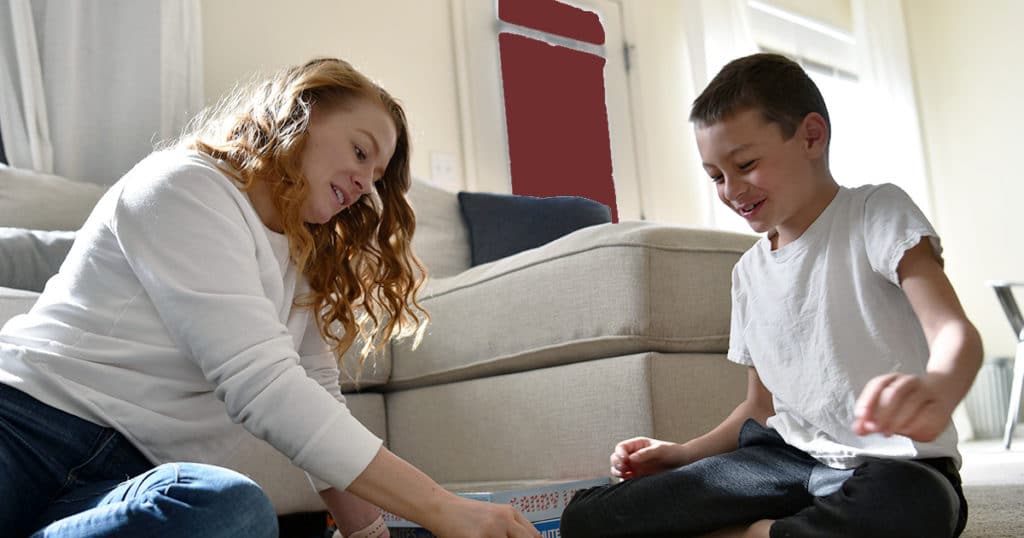9 tips for surviving children who aren’t yours
If you’re a single guy — whether due to lack of nuptials or too much divorce — at some point in your life you could end up living with children who aren’t yours. Whether they are the progeny of your girlfriend, housemate or sister, the fact remains: it’s hard to get through life without encountering other people’s kids.
When you do find yourself in this situation, how exactly do you figure out what the rules and boundaries are? Certainly, you have a few simple responsibilities towards these little walking germ factories regardless of who sired or birthed them. But how do you deal with the gray area of helping others’ kids without becoming overburdened by them, or worse, overstepping boundaries in discipline, philosophy or education.
Boundaries and Positive Adult-Child Relationships
Of course, we all want the kids to be alright, and it is just being a good human to ensure that those around us feel safe and cared for, regardless of age or relation. When it comes to other people’s kids (let’s just call them OPKs), we need to be very clear about how we intend to maintain healthy relations with them and their creator and where we might need to speak up, draw the line, or have a meaningful conversation.
Perhaps the most singularly important idea about OPKs is this; they aren’t yours. You are not their parent or guardian. At best, you are related. At worst, you have no relation at all outside of simple living arrangements (the roommate’s kid, or the next door neighbor’s child) or you are in the most difficult arrangement of all; living with the children of your new love interest, the dreaded position of step-adult. I say this is the hardest because how you choose to deal with OPKs will hugely determine your future in this new relationship. Put simply: Lose the kid, lose the parent. And vice-versa.
Disclaimer: I have no certifications or qualifications that make me any kind of expert in this field. I only know what I have lived through and what worked (or didn’t) for me, so use at your own risk.
In my defense, I have lived with plenty of kids, and even have a pretty normal college student of my own. I am also known as “Uncle Monkeyface” to a group of four growing boys. My sister seems to feel I’ve instilled into them various positive masculine traits. Perhaps that’s because, even while knowing I am hopelessly unprepared as a role model, I take my role seriously. Seriously means that, as I write this, I am listening to my current flatmate argue over how many more bites of sandwich are acceptable for her six-year-old son to consume before being allowed more video game time. I, too, have been the step-adult on a few occasions, sometimes doing so poorly, more often well.
Insights and Tips into Living with Children Healthily
What have I learned? One of the great truths about kids is that, by and large, their behaviors are universal. We’re all mostly wired the same, so the same approaches often work in most of our encounters.
I haven’t met a kid under the age of 14 yet who can’t be frozen in their tracks by a sudden, stern adult voice (I like to call it “Cop Voice”, that voice of authority that all parents learn that even as adults we still freeze when we hear it), nor have I met a toddler who can resist a bright smile and anything glittering or jingling.
Understanding that from the point of OPKs, you are a really big person and potentially either really safe or really scary, so you’ve got to be conscious of your interactions to create healthy living space with OPKs.
Without further ado, a few guidelines, in no particular order…
1. Not my circus, not my monkeys.
It is NOT your responsibility, except in emergencies, to train, educate, clean or correct either the child or the parent. Be wary of accepting more responsibility than you are comfortable with.
2. Engage at your own risk — and reward
Although you don’t have to, you still might want to interact, support and help. There’s nothing inherently wrong with this at all; just make sure you are clear on your level of engagement because once you start, it’s hard to stop.
3. Ask for clarifications from parents
If you are in a position where you feel you need to (or just want to) help instruct, play with or discipline the little person in your midst, make certain to clarify with the parent to what extent your supervision extends.
4. Be kind
This is obvious and applies everywhere. Be kind. Get it?
5. Know your boundaries because they won’t.
Children are great at pushing limits. Know yours, and don’t let them cross it. If/when they cross it anyway, be clear what options are available to you (from simply informing the adult in charge, to actually taking action on your own. Just make sure you know the rules first (#3)).
6. Don’t judge, but do notice
You might witness behaviors from the parent or the child that you don’t approve of, and that’s ok. Ask yourself whether the behavior really needs addressing, or whether it’s merely a personal preference: something you can simply watch without reacting to. Whose problem is it, anyway?
7. Offer criticism gently and praise often
I cannot stress enough that you need to treat your cohabitants with a great deal of compassion and a bit of kid gloves now and again. If you must speak out, do so from a position of offering support. Always make it a point to tell children they are appreciated. It goes a long way for everyone involved.
8. Avoid conflicts and do not interfere
Refer to #1. If it’s not your problem, don’t make it into one. Try to take the position of the audience, not the referee or worse, the judge.
9. Never get in the middle
If you don’t understand this by now, it’s too late for you. Unless you are extremely close to your housemates (at least family, if not closer) you are simply asking for trouble by stepping into a parent/child conflict.
Tips for Women Who Partner With Dads

Here are some ideas for women dealing with a partner’s kids. A key difference is that women can’t get away with being too aloof. But, at the same time, you’re not their mother.
- Get the Mom’s Perspective. Try to understand where the kids’ mom is coming from. It’s all about collectively ensuring the kids feel secure and loved.
- Connect on Your Terms. Find common interests with the kids that you genuinely enjoy. This builds a relationship that’s not about trying to replace their mom.
- Set Boundaries Early. Talk with your partner about your role in the kids’ lives. Make it clear to the kids too. This helps prevent confusion and establishes respect.
Remember, it’s about finding a middle ground where you can be a positive influence in the kids’ lives without overstepping boundaries.
I hope these guidelines help you to have wonderful and positive relationships with children of all ages! Good luck!


Some good advice here but I see the article is focused towards men. Do you have any extra advice for women who have to deal with a man’s kids (and the kids’ mother?). Also any special advice for same-sex couples? Thanks!
Thanks Terry. We’ve now added some advice for women as well. Not sure there’s a lot to say as far as same-sex couples go. It’s all about individual relationships and being sensitive to boundaries ultimately.
OPK! I love it (and the writing here). The OPK situation is one fraught with peril and that’s no hyperbole. No matter how badly behaved someone’s kids might be, they still have a special place in the parent/guardian’s heart so your unilateral involvement is just asking for trouble. I think the cardinal rule here is “not my circus, not my monkeys.”